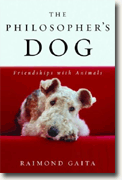Raimond Gaita
book reviews:
· general fiction
· chick lit/romance
· sci-fi/fantasy
· graphic novels
· nonfiction
· audio books
· author interviews
· children's books @
curledupkids.com
· DVD reviews @
curledupdvd.com
newsletter
win books
buy online
links
home
for authors
& publishers
for reviewers

 |
The Philosopher's Dog: Friendships with Animals Raimond Gaita Random House Hardcover 240 pages July 2004 |
|
I guess I figured this for a dog lover’s dog book, and what I got instead was broad-spectrum musings, likely to move in any direction and not always solely focused on pets or indeed on beasties of any kind.
Gaita has had a couple of dogs. When his childhood canine Orloff died, both he and his father cried - “the only time we cried together.” Now he has Gypsy, who “feels her age in her spirit as well as her body.” This provokes the question of whether dogs are capable of conceptual thinking. If they can anticipate feeding time, doesn’t this imply the concept of time in general? Do they know they’re old, will die? And if they don’t think, what kind of companions could they be? Because undoubtedly most pets are loved not for their original function – herding, burrowing, catching, harrowing – but for their skills at accommodating themselves to the lives of human beings. Gaita’s book looks, loosely, at these big questions – if we love a dog, why not a cow? And if we love a cow, how can we make food of it? When a beloved dog (or cat, or bird) dies, as Orloff did and as all pets must, we find hidden depths of love that we have objectified in our relationship with the pets in our lives. The sense of loss I feel even now for my favorite shepherd, Rusty, can bring me to fresh tears. This profound sensation is not necessarily open to intellectual or moral examination. It just is. Gaita’s book raises questions, answers some, and rambles from place to place a bit too much for my small brain. The book will be more attractive to students of philosophy than to someone looking for a smart book about animals, because it is more about the author than the creatures whose virtues he reflects upon - how he reasons, how he moves from subject to subject. However, he is not without heart. He loves dogs. That comes through, and is the saving grace of the book. © 2004 by Barbara Bamberger Scott |
|
|
|
 Click here to learn more about this month's sponsor! |
|
| fiction · sf/f · comic books · nonfiction · audio newsletter · free book contest · buy books online review index · links · · authors & publishers reviewers |
|
| site by ELBO Computing Resources, Inc. | |
 Not that there’s anything wrong with that. Raimond Gaita is a respected writer and a professor of moral philosophy, a discipline which reveals itself as he examines the mental ruminations of, for example, J.W. Coetzee’s Elizabeth Costello. Elizabeth begins to believe that she understands how animals feels, and she compares the slaughter of beasts to themoral crimes of the Holocaust. In the process, she “appears to be at the edge of madness.” Makes sense. If we really thought about our animal pals and how much they put up with to keep us happy, we’d all be a little crazy. And hungry too, unfortunately.
Not that there’s anything wrong with that. Raimond Gaita is a respected writer and a professor of moral philosophy, a discipline which reveals itself as he examines the mental ruminations of, for example, J.W. Coetzee’s Elizabeth Costello. Elizabeth begins to believe that she understands how animals feels, and she compares the slaughter of beasts to themoral crimes of the Holocaust. In the process, she “appears to be at the edge of madness.” Makes sense. If we really thought about our animal pals and how much they put up with to keep us happy, we’d all be a little crazy. And hungry too, unfortunately.